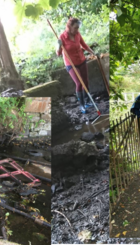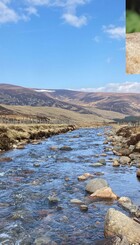- Cards
- List
.png)
Bothlin Burn Restoration and Climate Resilience Project
2022-10-27 • 4 comments • • Riverwoods 'Investment Readiness' Pioneers
Why our rivers?
The race to climate resilience, protecting our communities from climate breakdown, will be won or lost on rivers – and right now we're losing.
Damage to river systems has been so extensive that an urgent need has emerged, not only to conserve, but to restore these systems. Our degraded rivers are less able to cope with the rain we expect in the future, making flooding more likely to impact communities River rand riparian habitat restoration is an important measure to mitigate against these effects. Heavily modified rivers are often less resilient and have lost their ability to hold water in both droughts and floods.
Rivers are the veins of the Earth, transporting the water and nutrients needed to support the planet’s ecosystems, including human life. Unfortunately, they’re still threatened.
We must commit to recovering freshwater biodiversity, restoring natural river flows and cleaning up polluted water for people and nature to thrive.
Fish, amphibians, birds, insects, and invertebrates live in rivers, or find their food there. Rivers play a vital role in connecting habitats, and their value to plants and animals extends far beyond the surface area they cover.
Carbon starts its journey downstream when natural acid rain (which contains dissolved carbon dioxide from the atmosphere) dissolves minerals in rocks. This neutralises the acid and transforms carbon dioxide to bicarbonate in the water that then flows in our rivers. Bicarbonate can remain in water for thousands of years. (BBC)
Why Our River?
The Bothlin burn as it runs through the ancient woodland of the Moodiesburn Glen which sereates the communities of Moodiesburn and Chryston is a significant tribuary to the Luggie water and thereafter the clyde, restoring the river and riparian environment here has the capacity to bring multiple wins in tersm of biodiversity, community wellbeing, climate resilience, active travel, combatting health inequalites, improving community cohesion and restoration of fish populations. The burn being a positive contribution to the local environment rather than a polluted detrimental hazard is incredibly important to the surrounding communities who have expereinced an overwhelming loss of local greenspace which is essential to combat systemic health inequalities.
https://www.facebook.com/groups/NCCVols/permalink/2423176711147985/

Saving the Upland Summer Mayfly
2022-10-27 • 7 comments • • Riverwoods 'Investment Readiness' Pioneers
The Upland Summer Mayfly is in trouble. It lives in rivers and streams in upland areas where it thrives in the cold water conditions found there. But climate change is making these streams warmer. Freshwater invertebrates like the Upland Summer Mayfly are the most threatened by these changes. They are being pushed further and further up in to the hills, in to increasingly smaller, isolated areas. The Upland Summer Mayfly (Ameletus inopinatus) has already disappeared from lower altitudes in some areas - if we don't act now we could lose it completely.
There is hope though. We can build resilience in upland catchments by keeping upland watercourses cool. By establishing trees along the banks of these rivers we can help stop the Upland Summer Mayfly being lost from south and central Scotland.
We will work with land managers at multiple locations across Scotland to identify high risk watercourses and key areas for tree planting. We'll survey streams to give a baseline of the invertebrate fauna present. We'll train volunteers to monitor the invertebrate life in these streams and work with land managers to design planting schemes.
